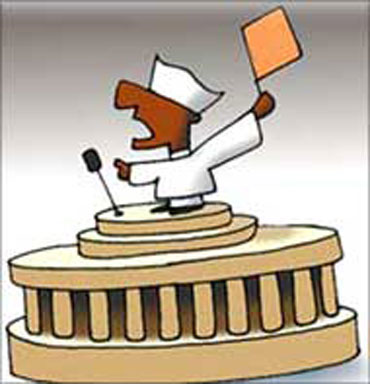 | « Back to article | Print this article |
MPs' salary and some serious monkey business
That extra rupee the joint parliamentary committee on MPs' salaries added to its recommendation made me wonder at first if the orthodox Hindu belief that a zero ending is inauspicious now also shapes official style.
Then I realised that though also symbolic, Rs 80,001 reflected a different cultural quirk in this land of a million superstitions.
Just as the king of Siam's head always had to be higher than anyone else's in The King and I, the supremacy of the people's representatives (which naturally doesn't mean of the people) had to be proclaimed by paying them more -- even if it's a token rupee -- than the senior-most civil servant.
How else would the world be assured that despite the corruption and the nepotism, the bureaucratic red tape, old boy networks of caste and class, dominance of pull over push, and the decisive power of wealth, India is a democracy where vox populi reigns supreme?
Lok Sabha and Rajya Sabha members on flying swans at taxpayers' expense can boast they take precedence over bureaucrats.
Click NEXT to read on . . .
MPs' salary and some serious monkey business
Not that anyone will begrudge them the right to raise their emoluments themselves because no one else would dream of doing it for them. Poor fellows, they must be content with rupee salaries even in this globalised world.
That must seem especially galling for those few who remember the halcyon era when India's creme de la creme were 'covenanted hands' in British managing agencies, luxuriating in overseas/hardship allowances, enjoying regular passage-paid 'home leave' and looking forward to retirement benefits in pounds sterling.
Younger MPs must cast covetous eyes at the campus placements that guarantee dizzyingly high wages for colleagues who chose to sail through IITs and IIMs instead of slogging it out in public life.
Though it looks grand enough in its pink circular majesty, the institution they serve (if that's the right word) can't compare with multinationals that enjoy the option of setting up headquarters in Hong Kong or Honolulu and whose bosses whizz in on executive jets to parley with the likes of Barack Obama on the beaches of the Gulf of Mexico. They can't even outsource parliamentary work to dreary Third World towns such as Kolkata and Kanpur.
Instead, MPs who love making tedious speeches are sometimes unfairly forced to suffer them. Forced to flit about the country in Air India's shabby planes without bars, leave alone any of the comforts of Air Force One, they bitterly regret that venal ministerial xenophobes killed the Tata-SIA proposal for a sleekly superior domestic airline.
Click NEXT to read on . . .
MPs' salary and some serious monkey business
Of course, they can travel in first class AC sleepers but everyone knows that these ramshackle boxes on wheels don't compare with even ordinary first-class compartments on the old EIR or BB&CI lines. Alas, the Palace on Wheels ignores most parliamentary constituencies.
What causes the people's representatives the most acute hardship is the economic revolution under Manmohan Singh which has almost erased the term 'scarcity value' from our vocabulary.
The market for telephone lines and cylinder gas connections is down in the dumps. Letters of recommendation can't compete with not-so-hidden hard-currency persuaders.
While profits are dwindling, outgoings remain as high as ever for no one has thought of reducing the cost of postage stamps and cups of tea. Five rupees a letter, to say nothing of paper and envelope, is the unkindest cut of all since writing itself is torture.
So, let us not be niggardly about how much of the 8 per cent growth finds its way into parliamentary pockets. In fact, instead of linking MPs' emoluments to the cost of living index, they should be firmly anchored to the growth rate . . . so long as India boasts the world's second-highest growth.
Click NEXT to read on . . .
MPs' salary and some serious monkey business
The other essential reform concerns overtime. The current debate overlooks the need to pay per hour for round-the-clock availability, including non-availability. Doctors and lawyers have chamber hours, officials pack up at five, union workers draw overtime without going to work. Why should MPs be disadvantaged?
Recalling Piloo Mody's crack about people who were unfit for anything else becoming journalists and those who couldn't even manage that becoming politicians, I must stress that while money is necessary, it mustn't be confused with quality.
My profession offers an obvious example. Journalistic wages have spiralled 10, 11 or 12 times in the last decade but I wish I could say it is reflected in quality.
You might get monkeys if you pay peanuts, as the old saying has it, but no sum of money, however vast, is ever going to turn monkeys into men.




